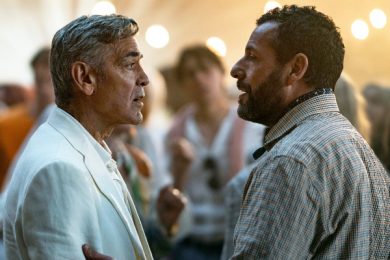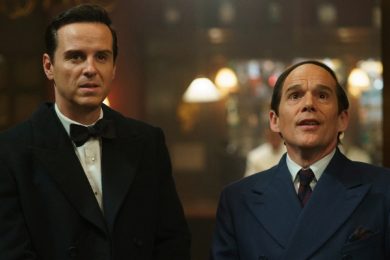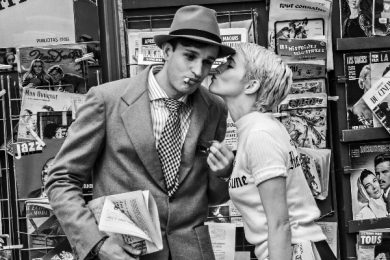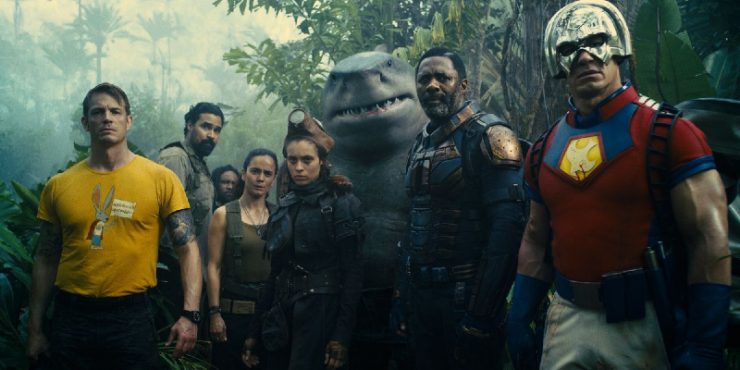Hollywood has been allowing a lot of mulligans in this young century. Don’t like Eric Bana or Edward Norton as The Hulk? Let’s try Mark Ruffallo. Fantastic Four movie was a giant dud? We’ll reload and give it another try. Not into Andrew Garfield as Spider-Man? We’ll give you Tom Holland; and if that’s not enough, we’ll also give you an animated Miles Morales in Into the Spider-Verse. The money in comic book adaptations are too big to give up after one or even two failures. It used to be that if a concept backfired with audiences, we washed our hands of them, but that day is gone. The studios will keep throwing out the same material until it finally sticks. The Suicide Squad is the latest, and perhaps most brazen example. When the 2016 Suicide Squad was met with lukewarm enthusiasm and disappointing box office receipts, DC just chopped it up and started again. They just put a “The” at the beginning of the new title.
Luckily for us all, The Suicide Squad is a clever enough movie to take the reformed title as one in a multitude of side-eyed jokes, charging through its story with constant reminders of what makes this genre so great. Compelling heroes who are complicated! Seemingly unstoppable giant monsters! A bipedal shark voiced by Sylvester Stallone! DC will probably never be a true commercial rival for Marvel, but The Suicide Squad shows their willingness to lean into R-rated material. In 2019, their standalone Harley Quinn film, Birds of Prey, showed a taste for a more demented ultraviolence, which made that film way more refreshing than whatever lightness-of-humanity drivel they were attempting with Wonder Woman 1984. For The Suicide Squad, they really lay on the horn in the demented department, and bring in James Gunn to get it done the right way.
Gunn’s star rose as a director after the first Guardian of the Galaxy film in 2014, which added a hilarious, cynical edge to the pristine Marvel Cinematic Universe. Guardians of the Galaxy, Vol. 2 revealed how little interest Marvel had in exploring Gunn’s darker urges, and even briefly fired the director after some controversial tweets from his past arose. The two sides came back together, but before he was un-fired, he coat-switched and took the lead on The Suicide Squad. Squad allows Gunn to indulge in his pre-Guardians love of creature-feature gore and disturbing body horror. From the first fifteen minutes we know that The Suicide Squad is not the even-the-children-can-join R-rated movie. It is not a film for the weak of stomach.
As the title suggests, there is a full gang involved. Our main protagonist is Bloodsport (Idris Elba), a sharpshooting prison inmate who is coerced by Amanda Waller (Viola Davis), a hard-nosed government figure in charge of America’s Task Force X program which deploys black ops teams to perform dangerous missions that the general public shouldn’t know about. Bloodsport wants no part of Waller’s mission, but when she threatens to imprison his young daughter, he relents. Joining him on this mission is a beefcake patriot named Peacemaker (John Cena), whose name belies his penchant for extreme, deadly violence (he’ll do whatever it takes to keep the peace). There’s also Ratcatcher 2 (Daniela Melchior; she’s the daughter of Ratcatcher 1), who can wield the force of the world’s rat population; and Polka-Dot Man (David Dastmalchian), whose power seems rather benign, until it isn’t. Lastly, there’s Nanaue (Stallone) a giant Great White Shark built like a tank and hungry for human flesh.
Their mission is to breach the fictional South American island of Corto Maltese and destroy the towering laboratory of Jötenheim, which is conducting a dangerous science experiment coded Project Starfish. Once on the island, the squad meets the not-murdered members of the other half of their team: Rick Flag (Joel Kinnaman) and the needs-no-introduction Harley Quinn (Margot Robbie, reprising a part that might be the best star-role combo in years). Bloodsport’s world-weariness finds balance with Flag’s good soldier routine and Ratcatcher’s bleeding heart earnestness, but it rubs against Peacemaker’s blunt nationalism. Everyone must contend with Harley Quinn’s innocent-until-proven-deadly quest for constant mayhem. The mix works, and all the actors find singular details here that make them pop, highlighting their ragtag conceit better than its Squad predecessor ever dreamed.
All of these movies have lots of plot, and The Suicide Squad is no different. The details here aren’t as cumbersome or overarching as the worst comic book films, and this movie may be the closest we ever get to a Hollywood film criticizing the banal cruelty of American imperialism (it almost gets there, but lets go of the rope at the last moment). Much like his first Guardians film, Gunn understands that his only real allegiance is to the audience. The film has been praised for its fidelity to its source material (I can’t speak to that), and it’s very obvious that Gunn is freed by this film’s embrace of barbarity. It’s dabbling in the forever-troubled politics of South America – and the US’s role in it – leaves something to be desired, but it fulfills its promises as an action ensemble. And it gives you the perk of well-soundtracked sadism.
I’m not generally a fan of violent films but it did feel nice to see a comic book movie take a more frank approach to the unsightly reality of the carnage that these movies possess. I’d venture to guess that The Suicide Squad‘s body count might pale in comparison to that of the bloodless, PG-13 Avengers film from 2012. Don’t get me wrong, I loved The Avengers – it is the standard bearer for this entire generation of superhero films. The Suicide Squad is merely a welcome alternative, accomplishing (finally) what DC and Warner Bros have been attempting to do for a decade: be a legitimate rival in creativity and character examination. In the simplest terms: Gunn is a skilled director who loves to gross us out, and it’s The Suicide Squad that gave him more leverage to do so.
Directed by James Gunn










